#html css complete course
Explore tagged Tumblr posts
Text
4 Facilities You Can Get From Full-Stack Web Development Institutions
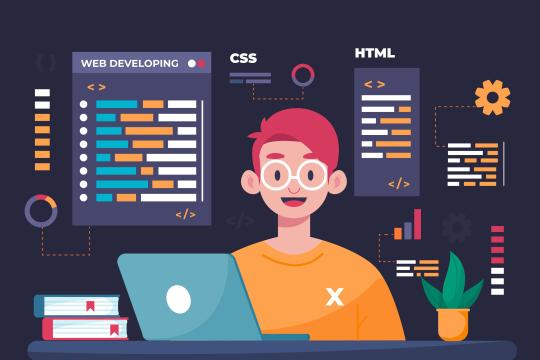
The age we are living in is dominated by extensive use of technology. Here, the web technology plays a strong role in establishing it as a prominent career opportunity. Regarding the availability of the best website development courses, you must consider joining hands with the best institution that offers the best full-stack web development course in Batala, Amritsar, Gurdaspur, Ajnala, and Tarn Taran. At present, quite a few institutions are available at your location, and that is why finding the best one can be slightly challenging.
Before you pick up and join the best provider of web development course in Amritsar, you must try to find out what facilities you can get from the top institutions:
Know the Curriculum and Course Content:
The heart of any learning experience is the content it offers. Ensure that the course you choose covers a comprehensive curriculum that includes both front-end and back-end technologies. Look for topics like HTML, CSS, JavaScript, databases, server-side scripting languages (e.g., Node.js, Python), and frameworks (e.g., React, Angular, Express). A well-rounded curriculum will prepare you to tackle real-world web development challenges.
Knowledge and Quality of The Faculty Members:
Your instructors play a pivotal role in your learning journey. Research their qualifications and experience in the field. Are they seasoned web developers with industry knowledge? Do they have a track record of successful teaching? Reading reviews and testimonials from previous students can provide insights into the quality of instruction.
Decent Practical Classes for Hands-on Experience:
Experts at the best institutions for full-stack web development courses in Batala believe theory classes are essential, but practical application is unparalleled! You must check if the institution provides you with enough theory and practical classes to get the right knowledge and hands-on expertise!
100% Support:
The complications in web development course in Amritsar, Batala, Ajnala, Gurdaspur, and Tarn Taran can make every student get the proper facilities from the institutions. The best institution for full-stack web development courses in Batala provides complete support to every student. It is an indispensable part of the services a student can expect from the institution.
The Bottom Line:
Selecting the best full-stack web development course in Batala requires careful consideration of course content, instructor expertise, hands-on experiences, and support options. Take your time to research and make an informed decision that aligns with your career goals. Remember, investing in your education is an investment in your future as a web developer.
Full Audio Version : Click Here
youtube
#php developer course#html css complete course#html css course#full stack web development course#full stack developer course#web development training#web development course#Youtube
0 notes
Text
HTML tutorial in Hindi | HTML Tools | HTML Document Structure
HTML Tools HTML tutorial in Hindi – HTML में Code लिखने और Run करने के लिये कुछ Basic Tools की जरूरत होती है जो लगभग सारे Computers में पहले से ही Installed होते हैं। इसके लिये mainly दो प्रकार के Tools की जरूरत पडती है: Text Editor (जैसे Notepad, Notepad++, Dreamweaver, Coffee Cup, Visual Studio Code आदि) Web Browser (जैसे Internet Explorer, Google Chrome, Firefox, Safari, Opera आदि) Text…
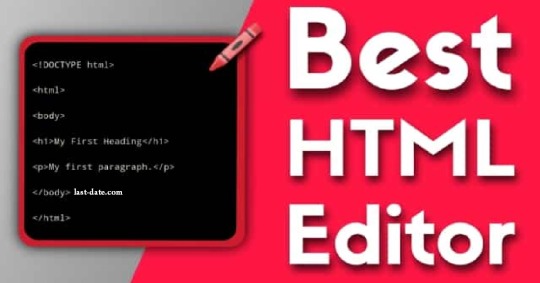
View On WordPress
#complete html tutorial in hindi#css html tutorial in hindi#html#html course in hindi#html css tutorial for beginners in hindi#html css tutorial in hindi#html full course in hindi#html hindi tutorial#html in hindi#html in one video#html in one video in hindi#html tutorial#html tutorial for beginners#html tutorial for beginners in hindi#html tutorial in hindi#html tutorials in hindi#learn html#learn html in hindi#what is html in hindi
0 notes
Text
back to basics
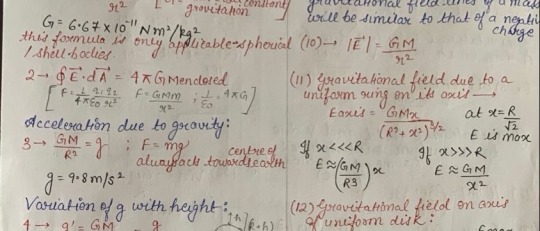
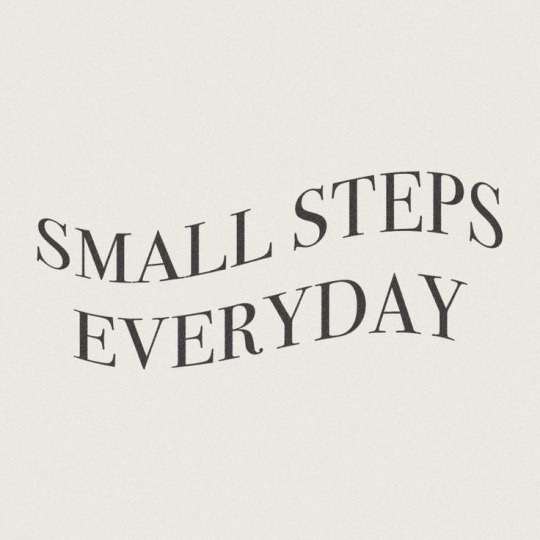
mostly free resources to help you learn the basics that i've gathered for myself so far that i think are cool
everyday
gcfglobal - about the internet, online safety and for kids, life skills like applying for jobs, career planning, resume writing, online learning, today's skills like 3d printing, photoshop, smartphone basics, microsoft office apps, and mac friendly. they have core skills like reading, math, science, language learning - some topics are sparse so hopefully they keep adding things on. great site to start off on learning.
handsonbanking - learn about finances. after highschool, credit, banking, investing, money management, debt, goal setting, loans, cars, small businesses, military, insurance, retirement, etc.
bbc - learning for all ages. primary to adult. arts, history, science, math, reading, english, french, all the way to functional and vocational skills for adults as well, great site!
education.ket - workplace essential skills
general education
mathsgenie - GCSE revision, grade 1-9, math stages 1-14, provides more resources! completely free.
khan academy - pre-k to college, life skills, test prep (sats, mcat, etc), get ready courses, AP, partner courses like NASA, etc. so much more!
aleks - k-12 + higher ed learning program. adapts to each student.
biology4kids - learn biology
cosmos4kids - learn astronomy basics
chem4kids - learn chemistry
physics4kids - learn physics
numbernut - math basics (arithmetic, fractions and decimals, roots and exponents, prealgebra)
education.ket - primary to adult. includes highschool equivalent test prep, the core skills. they have a free resource library and they sell workbooks. they have one on work-life essentials (high demand career sectors + soft skills)
youtube channels
the organic chemistry tutor
khanacademy
crashcourse
tabletclassmath
2minmaths
kevinmathscience
professor leonard
greenemath
mathantics
3blue1brown
literacy
readworks - reading comprehension, build background knowledge, grow your vocabulary, strengthen strategic reading
chompchomp - grammar knowledge
tutors
not the "free resource" part of this post but sometimes we forget we can be tutored especially as an adult. just because we don't have formal education does not mean we can't get 1:1 teaching! please do you research and don't be afraid to try out different tutors. and remember you're not dumb just because someone's teaching style doesn't match up with your learning style.
cambridge coaching - medical school, mba and business, law school, graduate, college academics, high school and college process, middle school and high school admissions
preply - language tutoring. affordable!
revolutionprep - math, science, english, history, computer science (ap, html/css, java, python c++), foreign languages (german, korean, french, italian, spanish, japanese, chinese, esl)
varsity tutors - k-5 subjects, ap, test prep, languages, math, science & engineering, coding, homeschool, college essays, essay editing, etc
chegg - biology, business, engineering/computer science, math, homework help, textbook support, rent and buying books
learn to be - k-12 subjects
for languages
lingq - app. created by steve kaufmann, a polygot (fluent in 20+ languages) an amazing language learning platform that compiles content in 20+ languages like podcasts, graded readers, story times, vlogs, radio, books, the feature to put in your own books! immersion, comprehensible input.
flexiclasses - option to study abroad, resources to learn, mandarin, cantonese, japanese, vietnamese, korean, italian, russian, taiwanese hokkien, shanghainese.
fluentin3months - bootcamp, consultation available, languages: spanish, french, korean, german, chinese, japanese, russian, italian.
fluenz - spanish immersion both online and in person - intensive.
pimsleur - not tutoring** online learning using apps and their method. up to 50 languages, free trial available.
incase time has passed since i last posted this, check on the original post (not the reblogs) to see if i updated link or added new resources. i think i want to add laguage resources at some point too but until then, happy learning!!
#study#education resources#resources#learning#language learning#math#english languages#languages#japanese#mandarin#arabic#italian#computer science#wed design#coding#codeblr#fluency#online learning#learn#digital learning#education#studyinspo#study resources#educate yourselves#self improvement#mathematics#mathblr#resource
745 notes
·
View notes
Text
Ad | Some Humble Bundle Goodies
One for the audio engineers - The Audio Arcade bundle gives you a whole bunch of royalty-free music and SFX as well as plugins to insert in all the major game engines. Ambient tracks, environmental sounds, explosions, you name it.
Money raised goes towards Children's Miracle Network Hospitals.
For those who dabble in Virtual Reality, the Upload VR Showcase with Devolver Digital has a bunch of Serious Sam VR games as well as the Talos Principle, a really solid puzzle game.
Money raised goes to Special Effect which helps people with disabilities enjoy games via accessible controllers. I've seen the stuff they do and it's honestly great.
Want to get into programming but don't know where to start? The Learn to Program bundle has a tonne of resources covering everything from HTML and CSS through to Python, C# and Ruby.
Money raised goes towards Code.org which seeks to expand participation in computing science by helping women and students of colour.
The Future Tech Innovators Toolkit is a software bundle with courses on Robotics, Electronics and programming with Raspberry Pi and Arduino.
Money raised goes towards Alzheimers Research UK.
The Home How-To Guides bundle offers a complete set of books for home improvements and projects. Want to know more about plumbing, home repair, bathrooms, wiring or carpentry? This bundle has you covered.
Money raised goes to It Gets Better, a charity that supports LGBT Youth.
Want to pick up the latest Elden Ring DLC? It's also available on the Humble Store with the key being redeemable on Steam.
105 notes
·
View notes
Text
Day 3: Beginning my first ever personal project
I'm honestly getting a little sick of beginning every post with, 'I continued working through the RWD course on freeCodeCamp', because that's pretty much all I do, every single day. And that's what I did today.
However, I started working on a personal project using HTML/CSS! Something that I realised today, as I started planning this project, is that I genuinely have no idea how to apply the knowledge that I've learned through the course. I know how to follow instructions and prompts, but I have no idea how to actually build a responsive web page. But, I think that's going to change as I start working on this project.
I'm trying to be as creative as possible with this project. I'm really going to challenge myself, and I hope this turns out the way I want it to. The main goal is to not take the easy way out with this project. The only way I'll learn is by facing difficulties.
Recently, I've noticed that I've been really struggling with creativity. I used to be an original thinker, but now, it seems as though I have lost the ability to think outside the box. And that is completely unacceptable in my world. Hopefully, this project will spark my creativity, while developing my coding skills.
With that, I shall take your leave and continue scribbling down all my ideas for this project onto my commonplace journal. Yes, my ideas have a real-world, physical home. I encourage you to keep one as well. It's a great way to build a relationship with yourself- bridge the gap between who you are and who you want to be, your thoughts and your feelings.

#html css#htmlcoding#css#computer science#coding diaries#coding#learning#studyblr#tech#computer#programming#technology#coder
37 notes
·
View notes
Text
JavaScript Fundamentals
I have recently completed a course that extensively covered the foundational principles of JavaScript, and I'm here to provide you with a concise overview. This post will enable you to grasp the fundamental concepts without the need to enroll in the course.
Prerequisites: Fundamental HTML Comprehension
Before delving into JavaScript, it is imperative to possess a basic understanding of HTML. Knowledge of CSS, while beneficial, is not mandatory, as it primarily pertains to the visual aspects of web pages.
Manipulating HTML Text with JavaScript
When it comes to modifying text using JavaScript, the innerHTML function is the go-to tool. Let's break down the process step by step:
Initiate the process by selecting the HTML element whose text you intend to modify. This selection can be accomplished by employing various DOM (Document Object Model) element selection methods offered by JavaScript ( I'll talk about them in a second )
Optionally, you can store the selected element in a variable (we'll get into variables shortly).
Employ the innerHTML function to substitute the existing text with your desired content.
Element Selection: IDs or Classes
You have the opportunity to enhance your element selection by assigning either an ID or a class:
Assigning an ID:
To uniquely identify an element, the .getElementById() function is your go-to choice. Here's an example in HTML and JavaScript:
HTML:
<button id="btnSearch">Search</button>
JavaScript:
document.getElementById("btnSearch").innerHTML = "Not working";
This code snippet will alter the text within the button from "Search" to "Not working."
Assigning a Class:
For broader selections of elements, you can assign a class and use the .querySelector() function. Keep in mind that this method can select multiple elements, in contrast to .getElementById(), which typically focuses on a single element and is more commonly used.
Variables
Let's keep it simple: What's a variable? Well, think of it as a container where you can put different things—these things could be numbers, words, characters, or even true/false values. These various types of stuff that you can store in a variable are called DATA TYPES.
Now, some programming languages are pretty strict about mentioning these data types. Take C and C++, for instance; they're what we call "Typed" languages, and they really care about knowing the data type.
But here's where JavaScript stands out: When you create a variable in JavaScript, you don't have to specify its data type or anything like that. JavaScript is pretty laid-back when it comes to data types.
So, how do you make a variable in JavaScript?
There are three main keywords you need to know: var, let, and const.
But if you're just starting out, here's what you need to know :
const: Use this when you want your variable to stay the same, not change. It's like a constant, as the name suggests.
var and let: These are the ones you use when you're planning to change the value stored in the variable as your program runs.
Note that var is rarely used nowadays
Check this out:
let Variable1 = 3; var Variable2 = "This is a string"; const Variable3 = true;
Notice how we can store all sorts of stuff without worrying about declaring their types in JavaScript. It's one of the reasons JavaScript is a popular choice for beginners.
Arrays
Arrays are a basically just a group of variables stored in one container ( A container is what ? a variable , So an array is also just a variable ) , now again since JavaScript is easy with datatypes it is not considered an error to store variables of different datatypeslet
for example :
myArray = [1 , 2, 4 , "Name"];
Objects in JavaScript
Objects play a significant role, especially in the world of OOP : object-oriented programming (which we'll talk about in another post). For now, let's focus on understanding what objects are and how they mirror real-world objects.
In our everyday world, objects possess characteristics or properties. Take a car, for instance; it boasts attributes like its color, speed rate, and make.
So, how do we represent a car in JavaScript? A regular variable won't quite cut it, and neither will an array. The answer lies in using an object.
const Car = { color: "red", speedRate: "200km", make: "Range Rover" };
In this example, we've encapsulated the car's properties within an object called Car. This structure is not only intuitive but also aligns with how real-world objects are conceptualized and represented in JavaScript.
Variable Scope
There are three variable scopes : global scope, local scope, and function scope. Let's break it down in plain terms.
Global Scope: Think of global scope as the wild west of variables. When you declare a variable here, it's like planting a flag that says, "I'm available everywhere in the code!" No need for any special enclosures or curly braces.
Local Scope: Picture local scope as a cozy room with its own rules. When you create a variable inside a pair of curly braces, like this:
//Not here { const Variable1 = true; //Variable1 can only be used here } //Neither here
Variable1 becomes a room-bound secret. You can't use it anywhere else in the code
Function Scope: When you declare a variable inside a function (don't worry, we'll cover functions soon), it's a member of an exclusive group. This means you can only name-drop it within that function. .
So, variable scope is all about where you place your variables and where they're allowed to be used.
Adding in user input
To capture user input in JavaScript, you can use various methods and techniques depending on the context, such as web forms, text fields, or command-line interfaces.We’ll only talk for now about HTML forms
HTML Forms:
You can create HTML forms using the <;form> element and capture user input using various input elements like text fields, radio buttons, checkboxes, and more.
JavaScript can then be used to access and process the user's input.
Functions in JavaScript
Think of a function as a helpful individual with a specific task. Whenever you need that task performed in your code, you simply call upon this capable "person" to get the job done.
Declaring a Function: Declaring a function is straightforward. You define it like this:
function functionName() { // The code that defines what the function does goes here }
Then, when you need the function to carry out its task, you call it by name:
functionName();
Using Functions in HTML: Functions are often used in HTML to handle events. But what exactly is an event? It's when a user interacts with something on a web page, like clicking a button, following a link, or interacting with an image.
Event Handling: JavaScript helps us determine what should happen when a user interacts with elements on a webpage. Here's how you might use it:
HTML:
<button onclick="FunctionName()" id="btnEvent">Click me</button>
JavaScript:
function FunctionName() { var toHandle = document.getElementById("btnEvent"); // Once I've identified my button, I can specify how to handle the click event here }
In this example, when the user clicks the "Click me" button, the JavaScript function FunctionName() is called, and you can specify how to handle that event within the function.
Arrow functions : is a type of functions that was introduced in ES6, you can read more about it in the link below
If Statements
These simple constructs come into play in your code, no matter how advanced your projects become.
If Statements Demystified: Let's break it down. "If" is precisely what it sounds like: if something holds true, then do something. You define a condition within parentheses, and if that condition evaluates to true, the code enclosed in curly braces executes.
If statements are your go-to tool for handling various scenarios, including error management, addressing specific cases, and more.
Writing an If Statement:
if (Variable === "help") { console.log("Send help"); // The console.log() function outputs information to the console }
In this example, if the condition inside the parentheses (in this case, checking if the Variable is equal to "help") is true, the code within the curly braces gets executed.
Else and Else If Statements
Else: When the "if" condition is not met, the "else" part kicks in. It serves as a safety net, ensuring your program doesn't break and allowing you to specify what should happen in such cases.
Else If: Now, what if you need to check for a particular condition within a series of possibilities? That's where "else if" steps in. It allows you to examine and handle specific cases that require unique treatment.
Styling Elements with JavaScript
This is the beginner-friendly approach to changing the style of elements in JavaScript. It involves selecting an element using its ID or class, then making use of the .style.property method to set the desired styling property.
Example:
Let's say you have an HTML button with the ID "myButton," and you want to change its background color to red using JavaScript. Here's how you can do it:
HTML: <button id="myButton">Click me</button>
JavaScript:
// Select the button element by its ID const buttonElement = document.getElementById("myButton"); // Change the background color property buttonElement.style.backgroundColor = "red";
In this example, we first select the button element by its ID using document.getElementById("myButton"). Then, we use .style.backgroundColor to set the background color property of the button to "red." This straightforward approach allows you to dynamically change the style of HTML elements using JavaScript.
#studyblr#code#codeblr#css#html#javascript#java development company#python#study#progblr#programming#studying#comp sci#web design#web developers#web development#website design#ui ux design#reactjs#webdev#website#tech
394 notes
·
View notes
Text
The Debuggers Assemble
Sebastian Stan x Reader Unhinged One Shot (Feat. The Avengers)

Summary : Behold! The 2nd version of this chaotic and unhinged story of Seb as a wannabe coder and this one features the Avengers!
A/N: This is just another stress induced story I came up with as I try to debug actual code on my project XD Hope you guys like it.
Warning: none at all, just an all out funny, unhinged and ridiculous story, somewhat like a sitcom XD
Word count: 1.7k words
Read more Sebastian and Bucky one shots here
---
It started as a normal Tuesday. Y/n was working on a client's website, surrounded by empty soda cans, a half-eaten granola bar, a cup of coffee that had been refilled countless times, and the dim hope that this web application project wouldn't kill her. She was almost done when she hit a wall—an infuriating wall in the form of a bug so elusive it might as well have been a mythological creature.
"What in the name of Jeff Bezos is wrong with you?!" she yelled at her laptop, slamming her hands on the desk.
"BOOM, BABY!"
She jumped, nearly knocking over her coffee as Sebastian burst into the room like Kramer from Seinfeld. He was wearing an Avengers bathrobe, a Viking helmet, and inexplicably wielding a hockey stick.
"Seb," she said, already exhausted by his mere presence. "What are you doing?"
"Helping," he said, dramatically tossing the hockey stick aside. It hit a lamp, causing it to crash to the floor.
"You're not helping. You're breaking my furniture."
"Pfft. Material possessions are temporary. But debugging is eternal."
"No," she said firmly. "Not this time. You're not touching my laptop. The last time you helped, the TV turned on by itself, showed me a cooking tutorial in Portuguese, and called me by name."
Sebastian gasped, clutching his chest like she'd insulted his honor. "You loved that tutorial. You said the flan recipe looked great."
"That's not the POINT!"
"Come on," he said, sitting next to her and grinning like a kid who just found a pack of fireworks. "I'm serious. Let me help."
She gave him a withering look. "Do you even know what CSS stands for?"
"D'uh. It's..." He paused, clearly making something up on the spot. "Cool, uh... Code... Stuff."
Y/N smirked. "What about HTML? Know what it is?"
"Of course I do," he said confidently. "It's... um... Hot Tacos Make Life better?"
She stared at him, deadpan. "Seb, I bet you don't even know what Javascript is."
"No, but I know about.. scripts?" He answered innocently and she rolled her eyes.
"Seb, just leave me alone and do whatever it was you were going to do with this.. outfit." She said, gesturing towards his Viking helmet.
But Sebastian ignored her, dragging his chair closer to her. "No way. I can help. I've acted as a hacker in movies. I know all about... coding stuff."
"Seb, no you haven't, and do NOT touch my laptop." She warned.
"Relax, babe. Let me at least look at it."
She reluctantly slid the laptop toward him. "Fine. But if you break something, you're sleeping on the couch."
Sebastian cracked his knuckles, grinning. "Alright, let's see what we've got here."
He squinted at the code for a solid thirty seconds like it was written in ancient Greek. "So, what's the problem?"
She sighed. "The JSON data isn't parsing correctly."
"JASON? Who's Jason?"
She groaned. "JSON. JavaScript Object Notation. It's a way to structure data."
Sebastian's face lit up. "Got it. So, it's like... Legos?"
"Sure, whatever helps you sleep at night." she rolled her eyes.
Sebastian cracked his knuckles and typed furiously.
—
<script>
let data = {
name: "Sebastian",
talent: "Acting",
debuggingSkill: "undefined"
};
console.log("Fixing everything like a boss"); // Motivational
data += "magic sauce"; // This'll work, right?
alert("IT WORKS... probably.");
</script>
—
He hit "Save" and refreshed the page. The screen went completely white, then flashed red like it was possessed.
"What did you do?!" she screamed.
"Magic sauce!" Sebastian said, pointing at the code.
"Magic sauce?! That's not a thing!"
"Not with that attitude," he muttered.
"Just give it back." She said, trying to grab the laptop back but he held it tight.
"No, no, babe. Let me try something else." He insisted, holding the laptop hostage.
She sighed, "Fine, just one more thing and if it doesn't work, give it back to me."
"Okay, okay, hold on. This will work. I can feel it!" He said enthusiastically, his fingers typing furiously.
—
<script>
let data =[ {
name: "Y/n",
character: "beautiful",
debuggingSkill: "powerful"
},
name: "Sebastian",
character: "chaotic",
debuggingSkill: "questionable"
},];
let love = data["Y/n"] + data["Sebastian"];
console.log("Y/n, you're the light of my life, and this code is dedicated to you.");
alert("Success, just like us.");
</script>
—
"Seb, that's not how you call JSON data." She protested but she couldn't keep a smile from escaping from her lips.
"Sometimes you have to go outside the box. Besides, love fixes everything." He said, winking at her and she rolled her eyes. He then pressed enter with a dramatic flourish.
The website blinked. The error message was gone, the navigation bar worked, the grid was perfect, the contact form sparkled like it had been kissed by the gods.
Sebastian turned to her with a smirk. "Told you. Love fixes everything."
Y/n's jaw dropped. "Wait... did you just—"
Before she could finish, the screen exploded into chaos. Every element on the page multiplied, filling the screen with hundreds of buttons labeled "Love you, Y/n" and an animated gif of a dancing cat in a tuxedo.
Sebastian leaned back, hands behind his head. "Well, it's the thought that counts."
She buried her face in her hands. "This is a nightmare."
"Okay, okay," he said, "Time to bring in the big guns."
Before she could grab the laptop back, Sebastian's hand flew over it again.
—
function callTheAvengers() {
alert("Avengers, assemble. We have a coding emergency.");
}
callTheAvengers();
—
"Seb, that's not gonna work." She protested.
"Wait for it." Sebastian said, raising his index finger to silence her and he hit the refresh button dramatically.
"Just give me the laptop back before I hit you with the hockey stick." She threatened.
"Babe, please. Trust me. Wait for it." He insisted and sure enough, suddenly she could hear the sound of a jet overhead. She glanced out the window and nearly fell out of her chair. The actual Quinjet was descending in the middle of their suburban street.
The neighbors were peeking out their windows in confusion, one even snapping pictures. "Sebastian, what did you do?!"
He smirked, "You saw the code, I called the Avengers."
Before she could protest, there was a knock at the door. Sebastian jumped up and opened it with a flourish.
Standing there were Steve Rogers, Tony Stark, Thor, Natasha Romanoff and Bruce Banner.
"We heard there was a coding emergency," Steve Rogers said seriously, stepping inside.
Y/n slapped her forehead. "Oh my God, I can't believe this is happening."
"What's the situation?" Tony asked, sunglasses on with a latte in hand.
Y/n sighed. "It's just a stupid JSON error."
"Ugh, JSON," Tony said, grimacing. "The silent killer of sanity. Move over."
Natasha Romanoff rolled her eyes. "Why am I even here? I don't code."
"Neither do I!" Thor announced, holding aloft his Mjolnir. "But I shall bring thunderous ideas!"
"Don't touch anything!" Y/n cried.
Bruce Banner set up his laptop. "Let's divide and conquer."
Sebastian handed everyone a keyboard which came out of nowhere and connected to nothing.. "Alright, team, let's do this."
Tony was the first to dive in.
"Alright, Y/n, let me show you how it's done." He typed on her laptop furiously:
—
<script>
function fixJSON() {
let billionDollars = true;
if (billionDollars) {
console.log("Hire someone else to fix it.");
} else {
console.log("Do it yourself, cheapskate.");
}
}
fixJSON();
</script>
—
"Tony," Y/n said, glaring, "that doesn't even make sense."
"It makes sense if you're a billionaire," he quipped. He hit refresh and the website turned all red and an iron man logo blinked in the middle.
Y/n slapped her forehead. "This is a nightmare."
"Here, let me try." Bruce Banner said. His approach was more... scientific.
"I think we need to test various inputs."
—
<script>
let gammaInput = [1, 2, "Hulk"];
let result = gammaInput.map(x => x + " smash");
console.log(result);
</script>
—
He hit refresh and the code ran. The screen displayed: '["1 smash", "2 smash", "Hulk smash"]'.
"Great, Bruce," Y/n said dryly. "Now my website is smashing things."
"You're welcome," he replied, adjusting his glasses.
Natasha sighed and leaned over. "Let me show you how to be efficient."
—
<script>
let secretSpyHack = () => {
console.log("Bug? What bug?");
};
secretSpyHack();
</script>
—
"That didn't do anything," Y/n pointed out.
Natasha shrugged. "Neither did I."
"Alright, alright, my turn." Steve said and he started typing with the enthusiasm of a soldier going in for battle.
—
function captainAmericaFix() {
let website = "running on freedom and justice";
let bugs = "punched out by the good ol' stars and stripes";
console.log("This code stands for something bigger.");
}
captainAmericaFix();
—
The website loaded. Patriotic music blared as an eagle soared across the screen, dragging the American flag behind it.
Y/n put her head on the desk. "I'm going to scream."
Thor stepped forward. "Stand aside, mortals! BEHOLD! I SHALL WRITE CODE AS MIGHTY AS MJOLNIR!"
He slammed Mjolnir onto the desk, causing the laptop to spark.
"Thor, no!" Y/n cried but Thor was already typing furiously.
—
<script>
let hammer = "Mjolnir";
function summonThunder() {
return hammer + " strikes!";
}
console.log(summonThunder());
</script>
—
He hit refresh and the website now displayed nothing but lightning bolts and the phrase "FOR ASGARD!" in Comic Sans.
Sebastian was laughing hysterically, tears streaming down his face. "This is the best debugging session ever!"
All of a sudden Peter Parker swung in through the window. "Hey, I heard there's a coding emergency?"
Tony groaned. "Of course the kid's here."
"Don't worry, I've got this!" Peter said, taking her laptop.
—
<script>
let webFix = bug => 'Spidey fixed ${bug}!';
console.log(webFix("JSON error"));
</script>
—
The website turned into a Spider-Man fan page.
Y/n buried her face in her hands. "I'm doomed."
"Enough!" Sebastian shouted, standing on a chair. "It's time for my genius to shine."
"Seb, NO!" she screamed.
"Seb, YES!" he yelled, typing with reckless abandon.
She glared at him as he continued to type nonsense but he suddenly stopped.
"Wait, I think you just missed a comma here." Sebastian said, deleting everything he typed before and adding the comma into her code.
He hit "Enter." The page refreshed. Miraculously, everything worked perfectly.
The room went silent. Even Tony looked impressed.
"How, how did you know?" She asked, her jaw dropped.
"Sometimes JSON is finicky like that." Sebastian shrugged.
Tony looked over his shoulder. "I was just about to say that."
As the Avengers packed up and left (after Tony insisted on taking credit for everything), Sebastian sat beside Y/n, who was still staring at her now-functioning website.
Sebastian leaned back on the chair, looking smug. "Told you I'd fix it."
"That was just beginner's luck." she shrugged.
"Oh come on, babe. What I did was genius." He insisted.
"I wouldn't say genius, but I think you know enough JSON now to be able to debug code."
"Yeah.. who's Jason again?" He asked, eyebrows furrowed and she threw a pillow at him.
"You're lucky I love you." She commented and he smiled as he pulled her by her waist and leaned in to kiss her.
For the rest of the day Sebastian strutted around the apartment, still wearing the Avengers bathrobe, Viking helmet and adding sunglasses while carrying a hockey stick and singing "We Are The Champions".
Y/n just stared at him and rolled her eyes, accepting her fate that she was dating a chaotic but somehow genius boyfriend and she wouldn't trade him for anything.
#sebastian stan#sebastianstan#sebastian stan fanfic#sebastian stan fanfiction#sebastian stan x reader#sebastian stan x y/n#sebastian stan x you#sebastian stan x female reader#sebastian stan fluff#sebastian stan one shot
21 notes
·
View notes
Note
Hii ! I’m in a bit of a problem rn and I’m wondering if you could help ( sorry for bothering you )
So school just finished and I’m on vacation for like 3 months so I really want to learn how to code ( I mainly want to make cool websites and stuff ). So I started to learn html and css but it just seems so overwhelming especially seeing all the ressources and tutorials online, could you please help me know what to learn first ? 💖

Hiya! 💗
Yeah, I can help! It can be overwhelming at first, but it's best to break it down into chunks and tackle them bit by bit.
For now, as a complete beginner, use these 3 resources:
HTML and CSS course video - LINK
W3School (for extra help) - HTML LINK | CSS LINK
MDN (for even extra help) - HTML LINK | CSS LINK
After that, work on projects to test your knowledge:
List of 11 projects to tackle - LINK
Here is the list of things you want to cover in HTML:
Basic structure
Tags and elements
Attributes
Forms
Semantic markup
Tables
The same but for CSS:
Selectors
Box model (margin, padding, border)
Typography (fonts, text properties)
Colours and backgrounds
Layout and positioning (floats, flexbox, grid)
Responsive design (media queries)
Transitions and animations
Now that you have a list of what you need to cover, tackle them one by one, making sure you understand the topic before you head over to the next. The video tutorial covers all of this and more. If you don't understand a bit in the video, stop and look on W3School and MDN for further understanding and then continue on with the video. Also, tackle the video slowing. Don't rush, don't do it, it'll just make the learning process even longer if you getting not understand things.
The resources I listed are my complete go-to. After that, as you've noticed, there are hundreds more. Go through the ones you need for the specific project you're working on or the topic you're studying only.
Hope this helps and good luck! 💻💗
#reources#coding#codeblr#programming#progblr#studying#studyblr#comp sci#tech#html#css#html css#coding resources
100 notes
·
View notes
Text
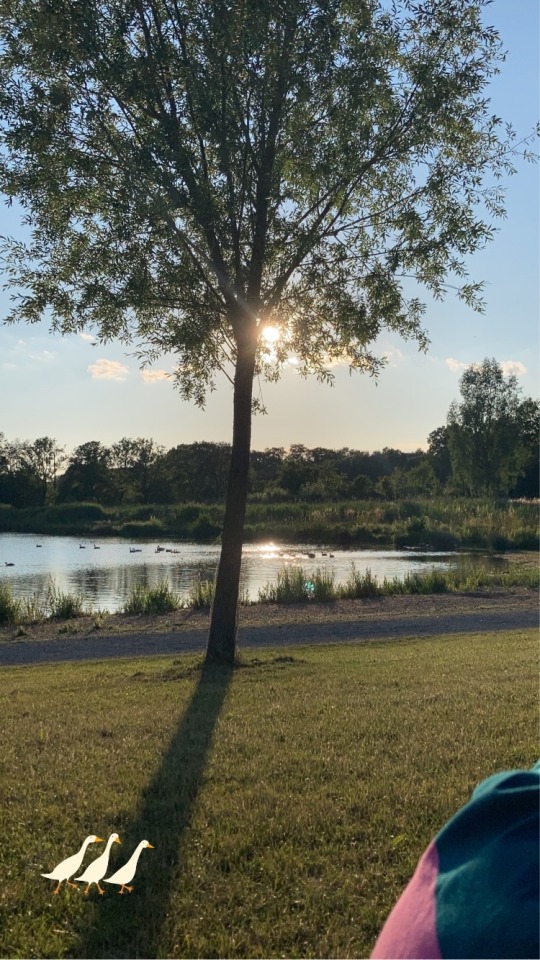
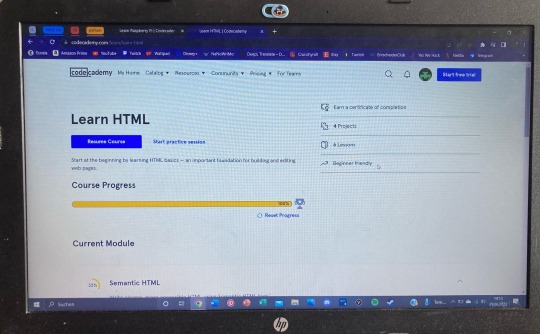
after a week of studying i've completed my first course about HTML!! so far i've learnt the basic facts and syntax about html, like <!DOCTYPE html>, <html> and <body> on top of any html document you build:)
Forms were the most interesting part to me of that course, it makes the website way more interactive and it's so much fun to play around with it.
My next step is to learn more about CSS and designing the website to my liking. I'm excited!
#codeblr#100 days of code#coding#programming#codecademy#htmlcoding#htmllearn#html css#html tags#html#studying#studyblr
113 notes
·
View notes
Text
Hello Tumblr
i have been on the platform since 2012 but i have never actually wrote any posts so i finally made a decision to create a new personal account (even tho that account have been created and been empty since 2020 but these last four years were hard for everyone). I graduated from a university in 2021 and got a translator degree but due to various reasons (in the world and in general) it was hard to apply it in job searching. and i've been feeling super lost and depressed all these years. and i decided to give a chance my small coding dream since i had since high school (in my country we need to pass entry exams at school and my computer science teacher prohibited me even trying passing the exam and during that time i was listless and AGAIN a lost teenager who had no idea what to do with their life so i didn't even try fighting and just gave up the idea and chose a path of my other passion: languages /after graduation i picked up japanese so i keep learning new stuff and it helps me a lot to cope ig/) so here i am just turned 26 this month and started learning how to code last month only. i had a slight idea of how html worked plus we had python usage in linguistic at university (for some reason it was super weird lol) i have been practicing for 10 days straight so i thought it's gonna be a good idea to participate in 100 days of coding as almost a complete beginner and track my progress (plus i haven't actually been practicing english that much so it is also a good reason to start that blog) so my progress in the last 10 days looks like that: 1. revised html basics 2. started css journey
i use online video courses on Youtube by freeCodeCamp.org and creating an actual web styling with a tutor does actually help a lot! i enjoy studying but i do understand that i need much more time to practice myself
after i am planning to start JavaScript but we'll see how it will go and i am still not sure which path to choose but ig front-end sympathise me a lot plus i am planning to pass JLPT N3 this year so maybe i will post some updates too but i am not sure yet is it better to participate in summer or winter exam i don't think anyone will be interested in my journey but when i see people posting their progress in any sphere it inspires me a lot
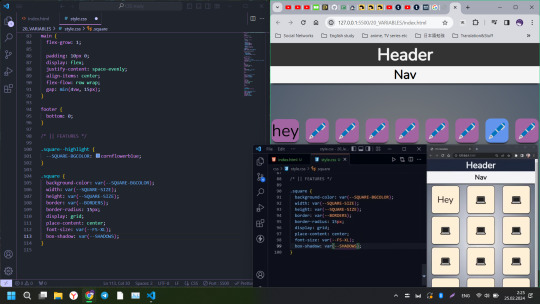

#10/100 days#personal#long post#100 days of code#codeblr#langblr#japanese#html css#beginner#100 days#hello tumblr#koneko codes
17 notes
·
View notes
Text
Kickstart Your Career with Decode Learning's Full Stack Web Development Course

If you're looking to launch a career in web development, look no further than Decode Learning's Full Stack Web Development Course. Know more…. https://bit.ly/47Rcstc
#web development course#web development training#full stack developer course#html css course#html css complete course
0 notes
Text
Week 2: Late update! Diving into HTML & CSS
Hey everyone!
I was supposed to update my Tumblr last week, but things got pretty hectic, and I completely forgot. Now that it’s the start of Week 3, I still want to share what I worked on last week—better late than never, right?
For Week 2, I focused on learning HTML and CSS. I watched a six-hour-long tutorial (yes, six hours!) and worked on some tasks along the way. I also went through a few online courses on HTML and CSS to reinforce what I was learning. However, I haven’t finished the entire course or the video yet since I had other tasks to do as well.
Even though my progress wasn’t massive, I’m glad that I now understand the basics of front-end coding! It’s a small step, but definitely a step forward. This week, my goal is to master HTML and CSS so I can finally start diving into JavaScript—which is both exciting and a little intimidating.
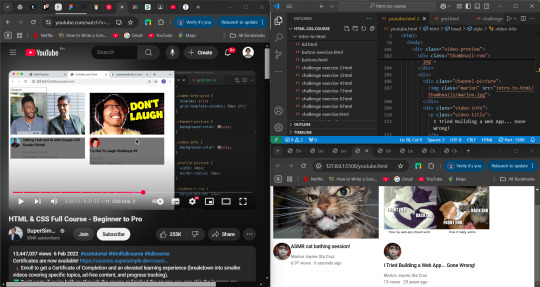

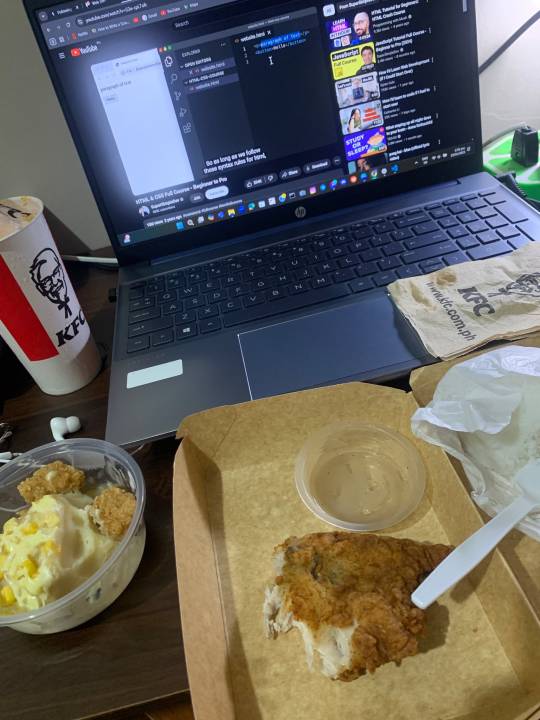
I've been obsessed with KFC lately! Famous bowl hits diff while making tasks. Aside from my coding journey, we also had a group activity during our class session last week. The interesting part? We were grouped on the spot with temporary group members! Despite that, we actually did really well, which was a great experience.
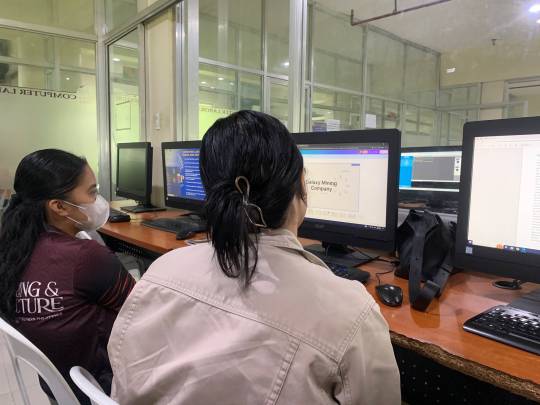

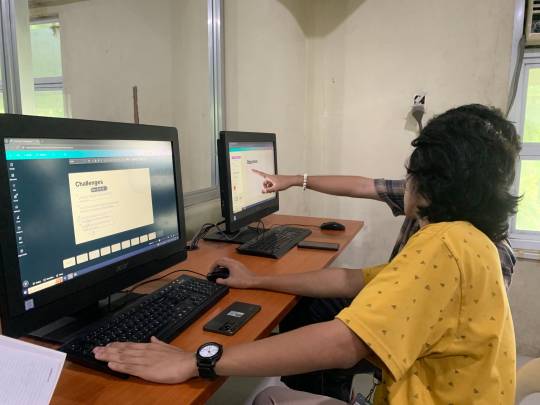
In case you're wondering why I’m learning all of this, it’s because I’ve been assigned to handle the front-end development of our project. It’s a big challenge, but I’m excited to learn and improve. Wish me luck!
That’s it for my Week 2 update. Hopefully, by the next one, I’ll have even more progress to share. Let’s keep learning! 🚀
3 notes
·
View notes
Text

Unlock your potential by learning website building with TechAircraft! In today’s digital age, having the skills to create your own website is invaluable. Our comprehensive courses guide you through every step, from understanding the basics of HTML and CSS to mastering advanced design techniques. Whether you're a complete beginner or looking to enhance your skills, TechAircraft provides hands-on training and resources to help you succeed. Join a community of aspiring web developers and gain the confidence to bring your ideas to life. With practical projects and expert guidance, you’ll be ready to showcase your skills and elevate your career. Start your journey today and transform your passion for technology into a powerful skill set!
#TechAircraft#WebDevelopment#CodingSkills#HTML#CSS#DigitalSkills#TechTraining#BuildYourFuture#OnlineLearning"
2 notes
·
View notes
Text
Ad | Absolute banger of a Web Design & UX bundle here. Honestly amazed at what's on offer here. HTML, CSS, Figma prototyping - Loads of solid basics to give you a solid foundation.
101 notes
·
View notes
Text
yo. so i got accepted into a course for full stack web development! orientation and classes start on the 17th this month! im excited, but also super nervous. I've made basic webpages before using HTML and CSS, and i've begun some bits of javascript, but those are just the basics of what the program goes over! I'll be getting into completely new territory soon.
4 notes
·
View notes
Text
Best of Web Development Courses: A Comprehensive Guide

Web development is a vital skill in today’s digital world. Whether you're aspiring to become a professional web developer or looking to enhance your skills, selecting the right web development course is crucial. With countless options available, it can be overwhelming to know where to start. This article provides a guide to the best web development courses available, helping you navigate through the top choices and find the one that suits your needs.
Why Take a Web Development Course?
Web development encompasses everything from creating basic websites to complex applications. The demand for skilled web developers is consistently high as businesses transition to digital platforms. By taking a web development course, you can:
Enhance your coding skills: Learn programming languages like HTML, CSS, JavaScript, and more.
Gain practical experience: Hands-on projects help you build a portfolio to showcase your skills.
Stay updated with industry trends: Modern courses keep you informed on the latest technologies and best practices.
Open career opportunities: Web development is a versatile field with various career paths such as front-end, back-end, or full-stack development.
Now, let’s dive into the top 10 web development courses that will give you the edge you need.
Top 10 Web Development Courses
The Web Developer Bootcamp – UdemyOverview: This course, created by Colt Steele, is one of the most popular web development bootcamps available. It covers everything from HTML, CSS, and JavaScript to more advanced topics like Node.js and Express.Why it stands out:
Over 63 hours of content.
Project-based learning with real-world applications.
Affordable pricing with regular discounts.
Ideal for: Beginners looking to get an in-depth introduction to web development.
Full-Stack Web Development with React – Coursera (offered by Hong Kong University of Science and Technology)Overview: This course focuses on the MERN stack (MongoDB, Express, React, Node). It's offered through Coursera by the Hong Kong University of Science and Technology, which gives it a reputable edge.Why it stands out:
Covers both front-end (React) and back-end development.
Offers a certificate from a prestigious institution.
Focuses on responsive web design.
Ideal for: Learners who want to focus on full-stack web development.
The Odin ProjectOverview: The Odin Project is a free, open-source curriculum that takes you through the entire web development process. It focuses on Ruby on Rails, JavaScript, and offers plenty of hands-on projects.Why it stands out:
Completely free with a community of learners.
Comprehensive learning paths from beginner to advanced.
Emphasizes practical projects.
Ideal for: Self-motivated learners looking for a free, community-driven option.
CS50’s Web Programming with Python and JavaScript – edX (Harvard University)Overview: CS50 is Harvard’s famous computer science course, and this specific track focuses on web programming. You’ll learn about Python, Django, JavaScript, and SQL through this rigorous program.Why it stands out:
Offered by Harvard University.
Covers complex web development topics such as Django and security.
Highly challenging, suitable for intermediate to advanced learners.
Ideal for: Developers with some background looking to dive deeper into web programming.
Complete Web Development Bootcamp – Udemy (Dr. Angela Yu)Overview: Dr. Angela Yu’s bootcamp is highly rated on Udemy for its engaging teaching style and comprehensive approach. You’ll learn HTML, CSS, JavaScript, Node.js, React, and even a little bit of web design.Why it stands out:
Over 55 hours of content.
Fun and engaging style with a focus on building projects.
Regularly updated to reflect the latest technologies.
Ideal for: Beginners who want to build a solid foundation in web development.
Responsive Web Design – freeCodeCampOverview: FreeCodeCamp is known for offering free, self-paced coding lessons, and its Responsive Web Design certification is one of the most popular. You’ll learn HTML5, CSS3, and responsive design principles.Why it stands out:
Free and self-paced.
300 hours of content including hands-on projects.
Community support and real-world project building.
Ideal for: Those looking for a free, structured way to learn responsive web design.
Zero to Mastery Complete Web Developer – Udemy (Andrei Neagoie)Overview: Andrei Neagoie’s course takes a hands-on approach to web development, covering everything from HTML and CSS to advanced topics like React and Node.js.Why it stands out:
Covers both front-end and back-end development.
Real-world projects like building a chat application.
Regularly updated to reflect industry changes.
Ideal for: Beginners to intermediate learners looking for comprehensive training.
Modern React with Redux – Udemy (Stephen Grider)Overview: React is one of the most in-demand front-end technologies today, and Stephen Grider’s course is perfect for those looking to specialize in it. This course covers React and Redux, focusing on building dynamic web applications.Why it stands out:
Specialized focus on React and Redux.
Project-based learning.
Great for intermediate learners.
Ideal for: Developers looking to specialize in React.
Learn Web Development – Mozilla Developer NetworkOverview: MDN’s web development course is a comprehensive, free resource that covers all aspects of web development. It’s created by the Mozilla Developer Network, known for its high-quality documentation.Why it stands out:
Free and constantly updated.
Covers the basics to advanced topics.
Reliable and well-documented resources.
Ideal for: Learners who prefer self-paced study with extensive documentation.
JavaScript, HTML, and CSS for Web Developers – Coursera (Johns Hopkins University)
Overview: This course, offered through Coursera by Johns Hopkins University, focuses on the fundamentals of JavaScript, HTML, and CSS, which are essential building blocks for any web developer.
Why it stands out:
Covers core web technologies.
Earn a certificate from a well-known university.
Focus on building real-world projects.
Ideal for: Beginners looking to get certified in web development fundamentals.
What to Look for in a Web Development Course
When choosing the best web development course for your needs, consider the following:
Skill Level: Are you a beginner or do you have some coding experience? Courses like The Odin Project and freeCodeCamp are great for beginners, while more advanced developers might prefer CS50’s Web Programming or Modern React with Redux.
Specialization: Do you want to focus on front-end (HTML, CSS, JavaScript), back-end (Node.js, Django), or full-stack development? Choose a course based on your career goals.
Project-Based Learning: A good web development course should include hands-on projects to help you apply what you've learned. The more projects, the better your portfolio will look to potential employers.
Certification: If you’re looking for recognition, consider courses that offer certificates from reputable institutions, like those from Coursera or edX.
Price: While some courses are free, others may require a one-time fee or subscription. Many platforms like Udemy offer discounts, so be sure to check regularly.
Final Thoughts
Whether you're just starting your journey in web development or looking to advance your skills, there’s a course out there for you. The best web development courses offer a blend of hands-on projects, updated content, and engaging instruction. As you consider the top 10 web development courses, think about your current skill level, your career aspirations, and your learning preferences. With the right course, you’ll be well on your way to becoming a proficient web developer.
Remember, learning web development is a marathon, not a sprint. Choose a course that fits your pace, stay consistent, and you'll see significant improvement in no time!
2 notes
·
View notes